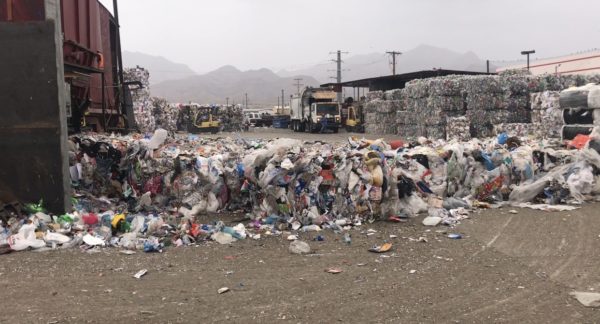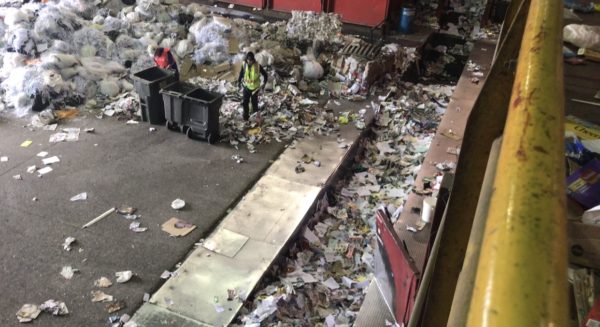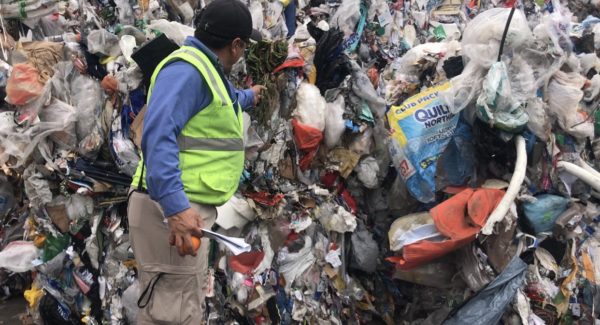El Pasoans are mixing too much trash with their curbside recycling, so officers from the city’s Environmental Services Department are checking bins to insure residents are in compliance. The crackdown comes as recycling costs have skyrocketed due to contaminated materials.
Last year China, which is considered the world’s largest consumer of recyclables, told the World Trade Organization that it no longer will accept any sub-standard solid waste, including soiled popular recyclable items like plastic and paper. The new policy went into effect on Jan. 1 and is having a big impact on U.S. recyclers.
“They consume about 50 percent of material that is generated in the Unites States,” said Morris Friedman, the president of Friedman’s Recycling in El Paso.

The pile of trash that is taken out of recycled bins.
The city of El Paso contracts with Friedman’s Recycling to process the items collected in the city’s curbside recycling program. The materials are taken to Friedman’s Recycling, where it is separated and then the company sells plastic, paper and metal to buyers.
The recycling program was earning money from 2009 until 2016 when cost increases put the program in the red. The changes in China’s policies are now adding to the costs.

Friedman employees trying to pick up recycled materials that were mixed.
“China sends it back and says: ‘we don’t want it; we don’t want your material.’ So now we pay to bail it, we pay to ship it and now we pay to ship it back. So now we are not making any money,” said Ellen Smyth, Environmental Services director.
The majority of the products that are produced from the curbside program are mixed paper followed by plastic. These items are later taken to Friedman and sorted to ship to potential buyers.
“The percentage of the mixed paper that the program is producing is now not marketable to China and since China was the largest consumer of that product and no longer taking it, there is now an oversupply of that type of material in the recycling market. The price of this commodity has plummeted,” Friedman said.
Environmental Services Department Deputy Director Kurt Fenstermacher said the fluctuations in the recycling market are not new.
“We are experiencing pressure from China which is putting a blip in the system and it’s no different from four or five years ago. This will weather out as it has in the past, but for Friedman and other companies that are trying to sell the material, it’s a difficult time,” Fenstermacher said.
Friedman is paying the city $0.50 per ton of recyclable goods. The money is then used for educational initiatives in the community.
The Environmental Services Department is working to educate the community on improving the quality of recycling by adding information on its website on how to recycle correctly. Inspectors/educators are being sent out to see if the community is recycling correctly.
The first infraction results in a warning where inspectors place a tag on the curbside blue bin. After the third warning, the blue bin will be removed, and the resident has to take a recycling class if they want it returned, said John Garza, Assistant Director of Environmental Services.

Photo by Elizabeth Amaro, Borderzine.com
“We want to make sure we put the best product in the blue bin, it is not an extra trash can and it is not an extra clothing bin,” Fenstermacher said. “We try to simplify it the best we can to make the education piece as broad as it can be.”
The city of El Paso wants the community to understand the importance of proper recycling to prevent contamination in the blue bin. Environmental Services Department provides information on its website on items that are acceptable and other items that can be taken to the citizen collection stations.
